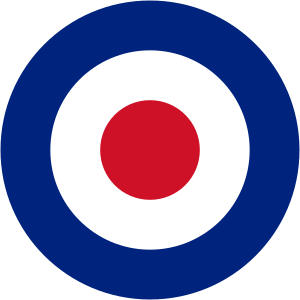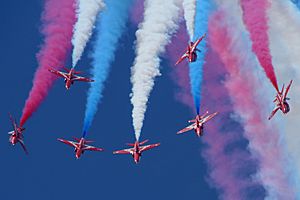National colours of the United Kingdom facts for kids
The national colours of the United Kingdom are usually red, white, and blue. These colours are the same as those on the flag of the United Kingdom, also known as the Union Flag. The Union Flag combines parts of the flags of England (which uses white and red), Scotland (blue and white), and a red X-shape for Ireland. Each part of the UK also has its own colours: England is often linked with white, Scotland with blue, Wales with red, and Ireland with green. Sometimes, black or gold are used for Cornwall, a unique county in England.

Contents
What Are National Colours?
National colours are special colour combinations that represent a country. They are often seen on a nation's flag, but they can also appear on things like sports uniforms, government buildings, or even in art. For the UK, red, white, and blue are the most common national colours.
Where Do the UK's Colours Come From?
The red, white, and blue colours of the UK come directly from the flags of its different parts:
- England: Its flag, the Saint George's Cross, is a red cross on a white background.
- Scotland: Its flag, the Saint Andrew's Cross, is a white X-shape on a blue background.
- Ireland: The Saint Patrick's Cross is a red X-shape on a white background. This was added to the Union Flag later.
When these flags were combined, they created the famous red, white, and blue Union Flag we see today.
Colours at Sea
At sea, 'national colours' refer to a special flag that shows which country a ship comes from. In 1867, a rule was made that British ships should use the Red Ensign (a red flag with the Union Flag in the corner) and the Union Jack with a white border. These flags helped other ships know that a vessel was British.
Images for kids
-
The colours on British Airways planes parked at London Heathrow Airport.
-
A red, white, and blue tube train in London.
 | John T. Biggers |
 | Thomas Blackshear |
 | Mark Bradford |
 | Beverly Buchanan |




